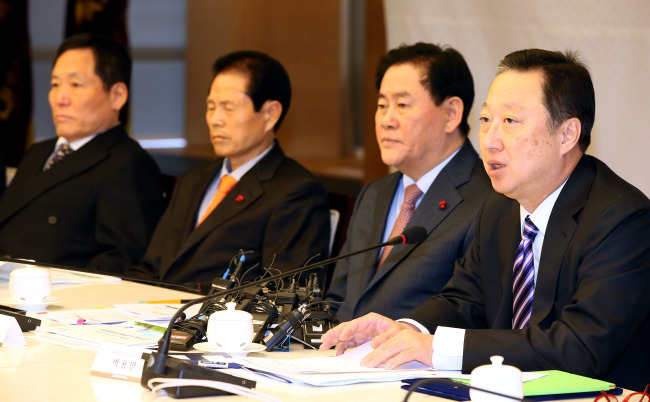South Korea’s Deputy Prime Minister and Finance Minister Choi Kyung-hwan urged private companies to support the government’s economic reforms by increasing employment and investment.
In a meeting with business executives affiliated with the Korea Chamber of Commerce and Industry in Seoul on Monday, the country’s top fiscal policymaker said the government would do its part by listening closely to the private sector and easing corporate regulations to spur investment.
“We hope that the companies will increase their hiring of young people who are about to graduate from college next month,” Choi said.
“We also urge companies to swiftly pursue investment plans.”
 |
KCCI president Park Yong-maan (right) speaks at a policy meeting with Finance Minister Choi Kyung-hwan (second from right) in Seoul on Monday. (Yonhap) |
This comes as Asia’s fourth-largest economy faces a youth unemployment rate of 9 percent, which is much higher than the overall jobless rate of 3.4 percent.
The finance minister also sought full support from the business leaders in implementing the three-year reform plan, saying that the government cannot miss its “golden opportunity” this year to change the economic structure for sustainability.
KCCI business executives, meanwhile, called on the government to fine-tune its antitrust and commercial laws, which separately apply to conglomerates that expand into new markets via restructuring or mergers and acquisitions.
They hoped that the government would implement a policy that supports companies to efficiently maximize resources for new market expansion.
In addition, the business association asked the government to expand export financing for small and medium enterprises, and improve a system allowing more private companies to participate in regional infrastructure development.
Finance Minister Choi said that he would make most of the ideas and suggestions given by the private sector when devising an economic policy.
The Finance Ministry proposed earlier this month that it would push state-owned enterprises to reduce debt and root out reckless management, and have them shut down or merge overlapping businesses as part of its reform drive.
It will also have its state-run enterprises adopt a wage peak system and a promotion system based on individual performance, adding that it will apply the performance-based measure on those who had worked more than seven years.
By Park Hyong-ki (
hkp@heraldcorp.com)





![[Exclusive] Hyundai Mobis eyes closer ties with BYD](http://res.heraldm.com/phpwas/restmb_idxmake.php?idx=644&simg=/content/image/2024/11/25/20241125050044_0.jpg)
![[Herald Review] 'Gangnam B-Side' combines social realism with masterful suspense, performance](http://res.heraldm.com/phpwas/restmb_idxmake.php?idx=644&simg=/content/image/2024/11/25/20241125050072_0.jpg)

